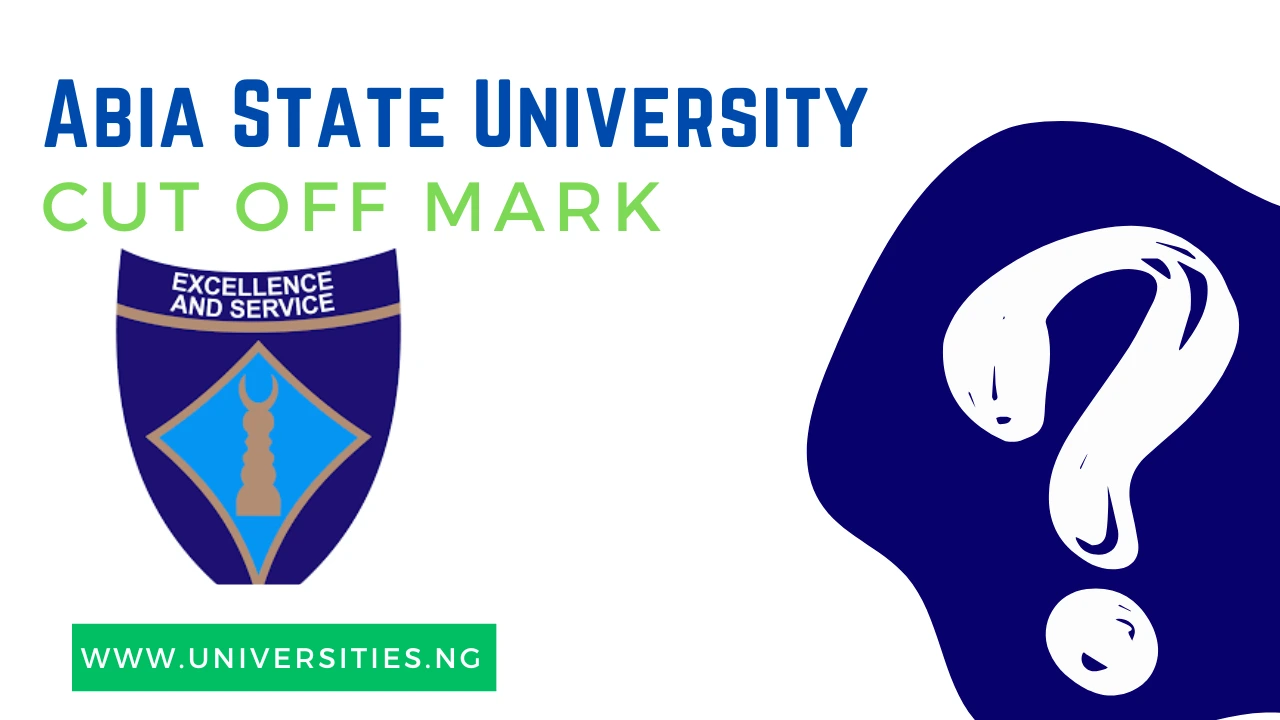Abia State University (ABSU), established in 1981, is located in Uturu, Abia State, Nigeria. Renowned for its academic excellence and diverse programs, ABSU is a hub for students pursuing higher education in various disciplines.
One of the critical aspects of gaining admission into ABSU is understanding the ABSU Cut Off Mark. This article dives into the concept, official thresholds, and processes associated with the cut-off marks, ensuring you have all the information needed to navigate the admission process successfully.
What is the ABSU Cut Off Mark?
A cut off mark is the minimum score set by an institution as a benchmark for admitting students into specific departments. It is established based on candidates’ performance in a particular examination. Notably, students who exceed the cut-off mark are given preferential consideration over those who merely meet the exact mark during the admission process.
The approved JAMB cut off mark for Abia State University (ABSU) for all courses for the 2024/2025 Admission is 160 and above.
To gain admission into ABSU for the 2024 academic session, candidates must achieve a minimum score of 160 in the UTME. Meeting this threshold makes candidates eligible to participate in the post-UTME examination for their preferred courses.
Certain programs, however, demand cut-off marks higher than 160. Applicants who meet or exceed the specified cut-off mark for their chosen course can proceed to purchase the ABSU Post UTME screening exercise form.
ABSU cut off mark for all courses
Different courses at ABSU have varying cut-off marks. Below are examples:
Faculty/Department | Minimum Cut-Off | Notes |
General Entry Requirement | 160 | This is the typical ABSU general minimum cut-off for UTME candidates. |
FACULTY OF AGRICULTURE | ||
Agricultural Economics & Extension | 160 | Some candidates may require higher scores if the program is competitive. |
Animal Science & Fisheries | 160 | |
Crop Production & Protection | 160 | |
Food Science & Technology | 160 | |
Soil Science | 160 | |
FACULTY OF BIOLOGICAL SCIENCES | ||
Biochemistry | 160–180+ | Often quite competitive; a post-UTME screening may set a higher benchmark. |
Microbiology | 160–180+ | Same as above. |
Plant Science & Biotechnology | 160 | |
Zoology & Environmental Biology | 160 | |
FACULTY OF PHYSICAL SCIENCES | ||
Computer Science | 160–180+ | Highly competitive department; actual cut-off may trend higher. |
Mathematics | 160 | |
Statistics | 160 | |
Physics | 160 | |
Chemistry | 160 | |
Industrial Chemistry | 160 | |
COLLEGE OF MEDICINE & HEALTH SCIENCES | ||
Medicine & Surgery (MBBS) | 160–220+ | Very competitive; historically requires a much higher score. |
Medical Laboratory Science | 160–200+ | Competitive; cut-off may exceed the general minimum. |
Nursing Science | 160–220+ | Also highly competitive; typically higher than the general cut-off. |
Anatomy | 160 | |
Physiology | 160 | |
Public Health | 160–180+ | |
FACULTY OF BUSINESS ADMINISTRATION | ||
160–180+ | High demand course; actual cut-off may be higher. | |
Banking & Finance | 160 | |
Economics | 160–180+ | Often requires a higher mark than the general minimum. |
Management (Business Management) | 160–180+ | |
Marketing | 160 | |
FACULTY OF ENVIRONMENTAL STUDIES | ||
Architecture | 160–180+ | Competitive course; may require higher UTME scores. |
Building | 160 | |
Environmental Resource Management | 160 | |
Estate Management | 160 | |
Fine & Applied Arts | 160 | |
Urban & Regional Planning | 160 | |
FACULTY OF EDUCATION | ||
Curriculum & Teacher Education (various subject areas) | 160 | |
Educational Management & Planning | 160 | |
Educational Foundations | 160 | |
Guidance & Counselling | 160 | |
Library & Information Science (Education) | 160 | |
Science Education (e.g., Biology, Chemistry Education) | 160 | |
FACULTY OF HUMANITIES & SOCIAL SCIENCES | ||
English Language & Literature | 160–180+ | May require a slightly higher score depending on competition. |
Foreign Language & Translation Studies (e.g., French) | 160 | |
History & International Relations | 160–180+ | |
Linguistics & Communication Studies | 160–180+ | |
Mass Communication | 160–190+ | Often set higher due to strong demand. |
Political Science | 160–180+ | |
Public Administration | 160–180+ | |
Religious Studies | 160 | |
Sociology | 160 | |
FACULTY OF LAW | ||
Law (LL.B.) | 160–220+ | Highly competitive; typically requires much higher than 160. |
(PROPOSED) FACULTY OF PHARMACY | ||
Pharmacy (if operational) | 160–220+ | Also typically competitive. |
Official General ABSU Cut Off Mark
ABSU typically announces its cut-off marks after the release of UTME results. For the 2025/2026 academic session, the general minimum cut-off mark is 160, although some courses require higher scores due to competition and academic demands. Always confirm the latest cut-off marks on the official ABSU website.
Admission & Screening Exercise at ABSU 2025/2026
Step 1: Meet the UTME Cut Off Mark
To qualify for admission, candidates must first achieve the minimum UTME score specified for their desired course.
Step 2: Register for ABSU Post-UTME
Eligible candidates should register for the post-UTME screening via the university’s portal. The registration process includes:
- Providing UTME details.
- Uploading required documents (e.g., birth certificate, O’Level results).
- Payment of the post-UTME fee.
Step 3: Attend Screening Exercises
The screening process often includes:
- Computer-Based Testing (CBT): An exam to assess subject-specific knowledge.
- Document Verification: Ensure all submitted documents are authentic.
Step 4: Check Admission Status
After the screening, candidates can check their admission status via the ABSU portal or JAMB’s CAPS platform.
Frequent Ask Questions
The general cut-off mark for ABSU is 160, though it varies by course.
No, Medicine requires a minimum of 240.
ABSU primarily considers first-choice candidates.
UTME result slip, O’Level results, birth certificate, and local government identification.
Yes, ABSU allows change of course applications, provided there are vacancies.
Direct entry candidates must meet departmental requirements.
Yes, all prospective students must participate.
Aim for high UTME and post-UTME scores and ensure excellent O’Level results.
Most screenings are now digital, but document verification may require physical presence.
Fees range from ₦80,000 to ₦120,000, depending on the course.
Yes, ABSU accepts applications from international students.
ABSU offers merit-based and need-based scholarships.
Approximately 5,000 students across various programs.
Missing the screening disqualifies you from admission.
Yes, ABSU provides part-time and distance learning options.
Understanding the ABSU Cut Off Mark and the associated admission processes is crucial for prospective students. By staying informed about requirements and preparing adequately, you can enhance your chances of securing a spot at this prestigious institution. Visit the ABSU official website for the latest updates and start your journey toward academic success today!











Can I study public health or nursing with 198 in ABSU
And again if am going for public health can I do switching of course in 200lvl to study nursing in ABSU